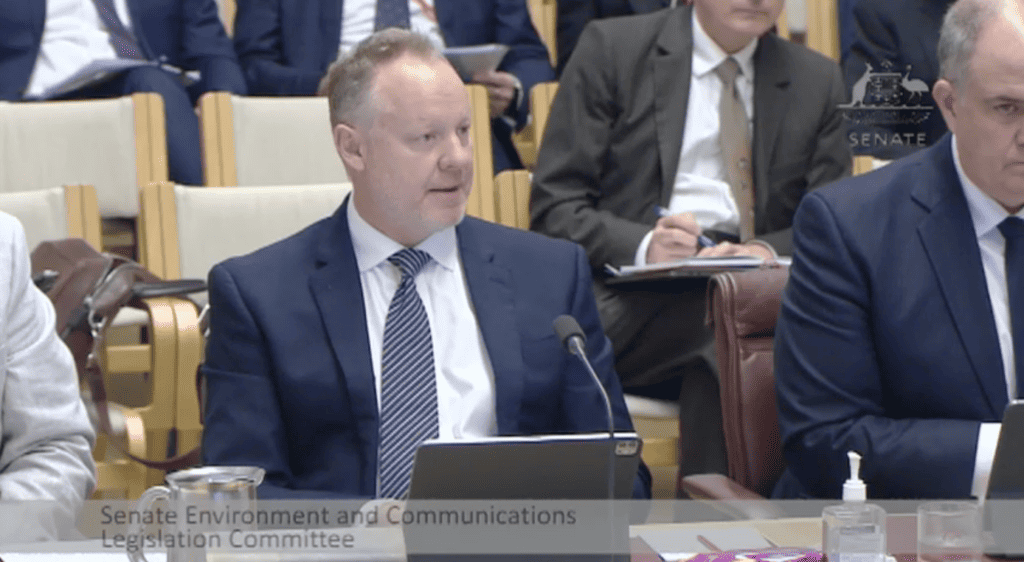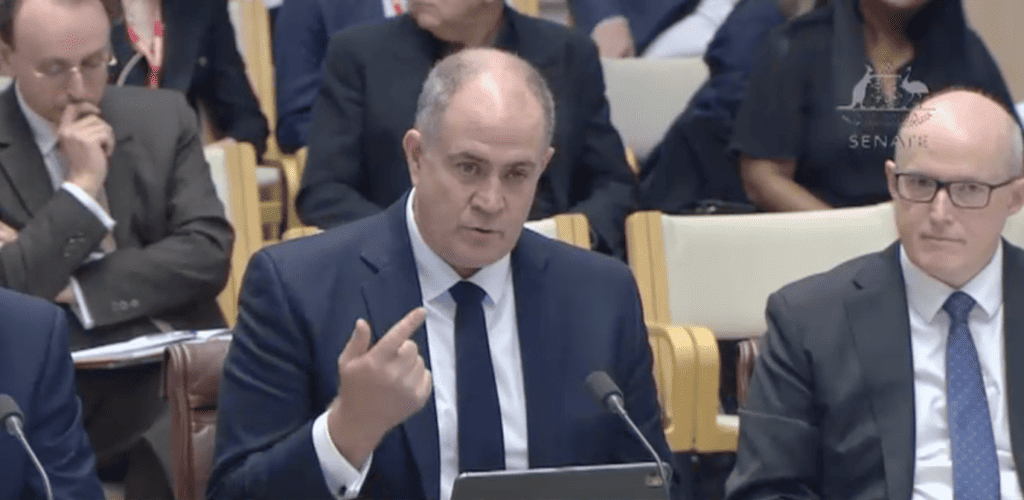SBS’ Managing Director has told a Senate Committee that it is “frankly scandalous” that smart TV manufacturers can bury or remove local BVOD services from their ecosystems.
James Taylor was speaking this morning alongside ABC Managing Director David Anderson about proposed prominence legislation, which is designed to ensure that free to air channels are easy for audiences to find on smart TVs.
Taylor recounted an example from 2018. “The best-selling connected TV in Australia wrote to SBS and advised that unless we agreed to a 15% revenue share arrangement and a placement fee, SBS would be removed from the ‘app launcher’ on the TV homepage for that brand.
“When SBS refused to pay, the manufacturer carried through on their threat … Then, in August 2020, that manufacturer delivered the same demand, but this time threatening to take SBS On Demand off the platform entirely. It was difficult for me to even find a representative in Australia for us to challenge this with.”

Taylor speaking in the Senate this morning
In 2023, it happened again with another platform operator with a market capitalisation of USD$1.7 trillion, which notified SBS that unless the public broadcaster agreed to “pay them 30% of the revenue we derived from being on their platform, they would exclude us entirely.”
“It is frankly scandalous that these massive global tech firms can unilaterally insert themselves as gatekeepers between Australians and their free Australian content, trusted news and information; services that have been intentionally developed and underpinned by decades of public policy,” Taylor continued.
Paramount and Network Ten boss Beverley McGarvey has experienced this first hand. She got a new TV for her office and it took 45 minutes to find the 10Play app. “I had to get an engineer,” she told the senators. The “entire point of the [prominence] conversation is to remove the friction” for users.
The ABC’s Anderson added that in some cases, when people search for Bluey on smart TVs, they are not taken to ABC iView, but to a paid service. Given the ABC is taxpayer-funded, Australian people have paid for Bluey once, Anderson argued, and should not have to pay again.

Anderson told Senators that Australians looking for Bluey are often directed to a paid service
Taylor made the point that 67% of SBS On Demand traffic comes from connected TVs. Any friction those users experience from trying to find SBS content or the SBS app is only exacerbated for vulnerable Australians, including those “who can’t afford to pay for streaming” or those for whom English is a second language.
“It’s worth noting that we serve people in 60 languages on these platforms, some of the most vulnerable Australians. We’re publicly funded and we want to make sure that the public … have a reasonable access point to that content, and they’re not being disintermediated by a platform that is doing so simply because it can, not because it should.”
Mike Sneesby, CEO of Nine, noted that the prominence of local SVOD services is automatically impacted by global deals between the manufacturers and streaming giants. There is a Netflix button on many modern remotes, for example. TV networks already pay for their position – “and we are happy to do that,” per SBS MD Taylor – but some positions are not on offer.
“The top positions are not even available for sale, at any price,” Sneesby said.
While all TV executives support the legislation, SBS’ Taylor stressed that he wants to see it implemented now, because “ABC iView and SBS On Demand could be kicked off these connected TV platforms at any time” and “the commercial motivations are strong for these device manufacturers and we shouldn’t expect them to comply a moment before they’re required to.”
Currently, the bill only requires local BVOD tiles be available on new smart TVs manufactured 18 months after the legislation receives assent.
“We’re very concerned about the unjustifiable 18 month delay in commencement of the prominence provisions which appears to be based on a misunderstanding of likely compliance lead times,” Taylor added.
“This unwarranted delay will significantly compromise the effectiveness of the bill and unduly delay the benefit to Australian audiences that it seeks to deliver.”
“It’s worth remembering that under this proposed framework, users will still have complete control over the apps on their TVs. Nothing in the legislation prevents someone from customising the homescreen adding or deleting apps as they wish. All this legislation does is ensure that local free services are available and visible as a default, giving us a fair shot at reaching our audiences and fostering a healthy media ecosystem where both local and internet international players can flourish.”
McGarvey also opposed the 18 month delay: “The government should not delay the implementation of prominence rules because in our experience, these changes can be implemented much faster on new TVs and even for existing TVs that regularly receive software updates.”
Taylor, Anderson, Sneesby, and McGarvey were joined by Seven CEO James Warburton, Free TV CEO Bridget Fair, and Free TV Chair Greg Hywood. They appeared before the Environment and Communications Legislation Committee, calling for the prominence and anti-siphoning bill to be strengthened.
Fair noted that, “with just a few simple changes, it could become an excellent piece of legislation that fulfills its purpose and safeguards Australians’ access to free TV for years to come.”
